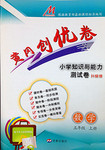题目内容
10. E-mail, as well as telephone, _____________ _ (play) an important part in daily communication.
10. is playing

练习册系列答案
 黄冈创优卷系列答案
黄冈创优卷系列答案
相关题目
题目内容
10. E-mail, as well as telephone, _____________ _ (play) an important part in daily communication.
10. is playing

 黄冈创优卷系列答案
黄冈创优卷系列答案